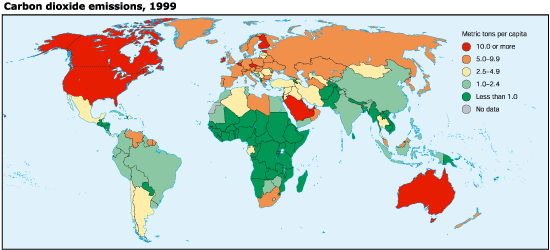The Trouble with Wilderness; or, Getting Back to the Wrong Nature is an article by William Cronon that I had to read for my Environmental Ethics class last semester. The article doesn't have much to say in the way of environmental policy, but I thought it was somewhat relevant to Judith's presentation last week in class. Cronon starts the article with what wilderness has become to many Americans:
"For many Americans wilderness stands as the last remaining place where civilization, that all too human disease, has not fully infected the earth. It is an island in the polluted sea of urban-industrial modernity, the one place we can turn for escape from our own too-muchness. Seen in this way, wilderness presents itself as the best antidote to our human selves, a refuge we must somehow recover if we hope to save the planet. As Henry David Thoreau once famously declared, “In Wildness is the preservation of the World.'"
I think this block quote hits the nail on the head when thinking about wilderness because so many Americans, including myself, view wilderness as this pristine, peaceful, haven from the fast paced reality of everyday life. With this conception of wilderness policies that follow are ones that protect wilderness, preserving its value to humans and animals, and are ones that don't allow the intrusion of industrial factors. Cronon, however, believes that our conception of wilderness is a reflection of our cultures and that we pretend that wilderness is real when it's actually a social construction. Maintaining this conception of wilderness is troublesome according to Cronon because it hides past injustices such as our displacement of Native Americans when we designated their home lands as "wilderness." Native Americans had been making their living off the land for centuries before Europeans arrived and our conception of wilderness drove these natives away for our own enjoyment of the land as pristine and peaceful. Cronon also argues that wilderness has become a "play ground for the rich" because many wilderness areas can be difficult to get to for those with limited incomes and then once in wilderness equipment also becomes an expensive endeavor therefore we are alienating poor people from experiencing nature.
To combat our misconceptions of wilderness, Cronon believes we must look to sustainable ways of using wilderness without the exclusion of native peoples, poor or rich peoples, and look to ways in which we do not harm nature for our own growth. I think Cronon makes some interesting points in his article. I only highlighted a few that I thought were the strongest and ones that could be useful when thinking about public policy. Using Cronon's arguments about wilderness I feel it is important to make sure policies do not make wilderness exclusatory and must also think sustainably about our uses of wilderness. If anyone is interested in reading the full article I have posted a link to it at the bottom of my entry:
http://www.williamcronon.net/writing/Trouble_with_Wilderness_Main.html
Tuesday, February 9, 2010
Subscribe to:
Post Comments (Atom)

This is an interesting topic. Humans evolved and developed on the Earth in their natural surroundings, but the more we have developed the less natural our surroundings become. The wilderness is more of an idea or concept now and is harder for people to grasp because, as mentioned in the post, accessing the wilderness can be expensive and time and resource consuming. Also, nature is pushed to the outskirts of civilization, which also hinders access as it is not an everyday experience.
ReplyDeleteI don't think it's possible to regard the wilderness with Cronon's sentiments. We're living in the 21st century where, if the section of the economy whose only goals revolve around big-business/industrialist-minded thinking, there would really be no need for the wilderness. It doesn't do anything to increase their profits (unless they're directly related to wilderness based products, of course). Preserving the wilderness as national wilderness sites may be the only way, in our time, to have a wilderness at all.
ReplyDeleteI think that the idea of wilderness needs to be incorporated into our everyday lives, so that people feel more compelled to preserve the environment where they live. The idea of the wilderness being "out there" gives people the idea that it is ok to live in an unsustainable way because they don't live in the socially constructed concept of the wilderness. No matter where people live, whether it is considered wilderness or not, their actions can effect places all over the earth. Driving one's car, taking a plane, using a plastic bottle, these all effect the areas that people consider wilderness, and people need to be more aware of the consequences of their actions and appreciate the glimpses of wilderness around them as opposed to making a huge deal about pristine environments.
ReplyDeleteI disagree that it's impossible in modernity to consider wilderness as defined by Cronon. Economic systems are increasingly considering environmental costs and damages, including loss of environmental amenities from wilderness. As these systems begin to hold firms liable for their environmental degradation, economic value placed on the environment (including wilderness) seems inevitable.
ReplyDeleteExcluding people from without the means to get there is another source of inequity in our society. Their tax dollars pay for the protection and maintenance of these lands.
ReplyDelete